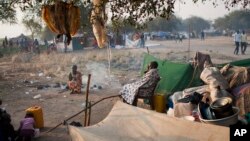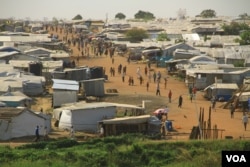Peter Bol Wal, 35, lost his left leg below the knee during fighting against Sudan in 1994. He now lives in a United Nations protection of civilians site in the South Sudanese capital of Juba, where he says life is not easy.
"You know, before when the conflict erupted, it was a bit better because the disabled person is not like [an] able person," Bol said. "Now, when the things become tough, it is difficult for a person with disabilities to cope with this situation and to survive in the way that other people struggle for their lives, because of war."
Human Rights Watch says elderly people and those with disabilities in South Sudan are particularly vulnerable to the effects of the conflict that began in December 2013, citing "numerous" documented instances of people being shot, hacked to death or burned alive in their houses. The group says these populations have been targeted and abused by warring parties, often because of their inability to flee attacks.
"Civilians have been, and continue to be, attacked by the parties," said Jonathan Pedneault, HRW's South Sudan researcher. "Now, if you are not able to flee ahead of an attack, or when the parties come to your house, or come to your village, you are automatically more vulnerable to abuses."
Pedneault says their caregivers are also more vulnerable.
"Now, one also needs to remember that when you are fleeing an attack, when there are bullets flying all around you, it is often very difficult even for relatives and family members to carry someone with a disability," Pedneault said. "It obviously slows you down, and so we have also had some cases of people with disabilities who have been telling us that they actually asked their relatives to leave them behind because they did not want to slow them in their flight."
But Pedneault says there is evidence of commanders sparing the elderly and those with disabilities in some situations. He cites one example from February, when Wau Shilluk was taken over by Sudan People's Liberation Army forces.
"One of the commanders who was in charge of the SPLA soldiers there ordered his soldiers to take care of people with disabilities, and they were not only brought in one specific place, but then provided also with food and water by the soldiers," Pedneault said. "And that is interesting because it also contradicts, heavily, claims by the parties that often the crimes that we are witnessing are a result of 'bad apples,' that they are the result of undisciplined soldiers. And the chain of command inside the SPLA is so broken down that 'We cannot possibly control the soldiers,' but I think those examples show exactly the contrary.
"It shows that when the SPLA wants to act in a manner that is respectful of international norms and international law, it can," he added.
Human Rights Watch says it interviewed more than 45 elderly people and those with disabilities at displacement sites in Juba and Malakal, as well as in Panyijar county in the former Unity state, where the U.N. declared famine in two counties in February.





